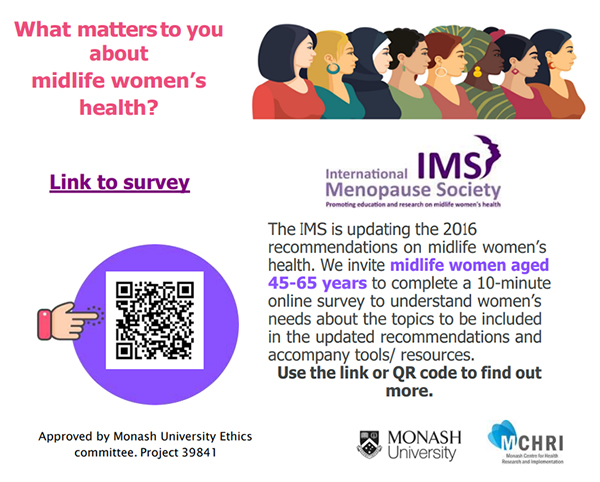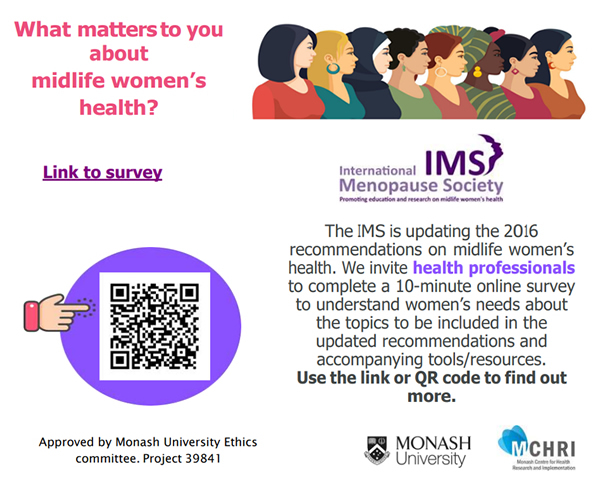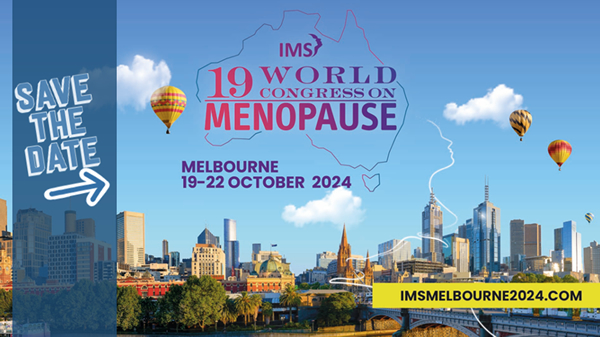Management of menopause
By Dr Karen Magraith and Dr Christina Jang
The article is available free online from the Australian Prescriber, Issue 3 October 2023
Article Summary
During perimenopause and after menopause, women may experience diverse symptoms.
All women require a comprehensive assessment of their current health and risks for future disease, appropriate screening, and promotion of a healthy lifestyle.
Menopausal hormone therapy is the most effective treatment for menopausal symptoms. It can be offered to symptomatic patients with no contraindications following an individualised discussion about the risk of harms versus benefits.
Menopausal hormone therapy is recommended for women with premature ovarian insufficiency (menopause occurring before 40 years of age) regardless of symptoms, unless contraindicated.
Nonhormonal medications may improve symptoms for women who have contraindications to, or do not wish to take, menopausal hormone therapy.
Reference
Magraith K, Jang C. Management of menopause. Aust Prescr 2023;46:48–53. doi.org/10.18773/austprescr.2023.014

The impact of symptoms attributed to menopause by Australian women
AMS was invited by Jean Hailes for Women’s Health to co-author the report The impact of symptoms attributed to menopause by Australian Women from the results of the 2023 Jean Hailes National Women’s Health Survey. AMS was able to add some valuable input to this report including:
- Results from the survey need to be interpreted with caution as the survey relied on women’s unprompted knowledge of menopause including whether and when they had reached menopause, whether they reached menopause naturally or due to surgery or treatment as well as the symptoms of menopause;
- Symptom severity ratios in this survey are similar to previous published studies;
- Less than half of women aged 18-45 years who attributed their symptoms to menopause in the survey had seen a doctor about their symptoms. Community awareness and GP education about premature and early menopause is needed to reduce the increased risk of chronic disease in these women;
- All women at midlife need a health assessment, regardless of the frequency or severity of their symptoms, to reduce their risk of chronic disease and bone loss. GPs need support and education to assess women in midlife for increased postmenopausal risks.
- Nearly four in five (72%) mid-life women who experienced bothersome symptoms they attributed to menopause found their symptoms made it hard to perform daily activities, work or study, or disrupted sleep or caused them to miss exercise or days of work or study;
- 58% of midlife women with bothersome symptoms they attributed to menopause;
- 17% of midlife women who reported they had reached menopause took an extended break from work due to bothersome menopause symptoms.
- Menopause should be framed as an opportunity for women to take stock of their health and implement strategies for improved health and healthy ageing; and
- A community awareness campaign is needed to direct women to evidence-based information and resources about menopausal symptoms and treatment options.
Menopause Essentials Update | 4 November 2023, Perth WA
Join us for lunch followed by an update on the essentials of menopause management. This workshop is aimed at GPs, gynaecologists, endocrinologists and other health professionals who are seeking a comprehensive review of the current issues that face them in the diagnosis and management of menopausal symptoms.
Presentations will include case studies and there will be time for questions.
Topics include:
- Menopause consultation: A structured approach to decision-making
- Prescribing MHT: Evidence base, tips, tricks and practice pearls
- Non-hormonal treatment for troublesome symptoms of menopause: what’s the evidence?
- MHT in difficult circumstances
Download flyer here:  Menopause Essentials Update Saturday 4 November 2023
Menopause Essentials Update Saturday 4 November 2023
AMS members: free
AMS non-members: $100 (GST inc)
Register
Go to Trybooking at: www.trybooking.com/CLOZA
Continuing Education
RACGP 3 CPD Hours
ACRRM 3 points

Updated Information Sheets: AMS Guide to MHT/HRT Doses
The AMS Guide to MHT/HRT Doses for both Australia and New Zealand have now been updated and are available on the AMS website.
AMS Guide to MHT/HRT Doses Australia only
AMS Guide to MHT/HRT Doses New Zealand only
Dr Christina Jang
Coordinator, AMS Information and Fact Sheets
Survey for IMS 2016 Recommendations Update
The IMS is updating the 2016 Recommendations on Midlife Women’s Health. Two surveys have been developed by the IMS and Monash University to understand women’s needs about the topics to be included in the updated Recommendations and the accompanying tools/resources. One survey is for midlife women aged 45-65 and one is for health professionals.
We invite health professionals and women to complete the appropriate 10-minute online survey. Please follow this link for more information.
For Health Professionals
For Women

IMS World Congress on Menopause in Melbourne 2024
Health Professionals - join AMS for Members-only content
IMS Live 16 October 2023: Vaginal laser therapy for GSM/VVA: where we stand now - a review by the EUGA Working Group on Laser
Due to the increase in female life expectancy (around 80 years) observed in the different continents and with an average age at menopause onset of 48.6 years, it is becoming very important to seek new strategies to maintain an adequate quality of life in the different aspects of mid-life women's health. In this regard, it has been observed that the Genitourinary Syndrome of Menopause (GSM) can affect up to 75% of postmenopausal women, seriously altering different aspects of their lives. The most frequently reported symptoms include vaginal dryness, pruritus, burning, dyspareunia, altered urination frequency, urgency, dysuria and different degrees of stress urinary incontinence. Sexuality is one of the most affected aspects...
IMS Live 23 October 2023: Understanding the brain during menopause
Zhu and colleagues [1] have undertaken a study to address the lack of a specific cognitive assessment in relation to menopause by evaluating the Everyday Memory Questionnaire-Revised (EMQ-R). The EMQ-R was first developed as a 35-item questionnaire to be used after closed head injury that was subsequently reduced to a 13-item questionnaire for broader use. The latter was what the authors evaluated in a “menopausal population” of women aged 30-60 years, recruited by targeted advertising to achieve a sample of women experiencing menopausal symptoms (i.e brain fog, hot flushes, and night sweats). Menopausal hormone therapy (MHT) users and women using therapies that would mask or inhibit menstrual bleeding, and hysterectomised women were not excluded. However, menopause staging was based on STRAW+10 bleeding criteria [2]. A total of 417 women completed the questionnaire, subdivided into premenopausal (n=107), perimenopausal (n=149), and early postmenopausal (n=161) groups and hormonal contraceptive (HC)/MHT use was 37%, 27% and 40%, respectively. The majority (>85%) had graduate education...
Life Expectancy and Major Chronic Diseases - video
Dr j\JoAnn E Manson discusses how the menopause transition influences cardiometabolic risk factors and the relationship between vasomotor symptoms and heart disease. She reviews that early onset of menopause in women before age 45 years is considered a risk factor.
Our Menopause World October 2023 Newsletter
AMS is an affiliate of IMS See latest available copy.
European Menopause and Andropause Society (EMAS) Newsletter
AMS is an affiliate of EMAS. See a copy of the latest newsletter.






